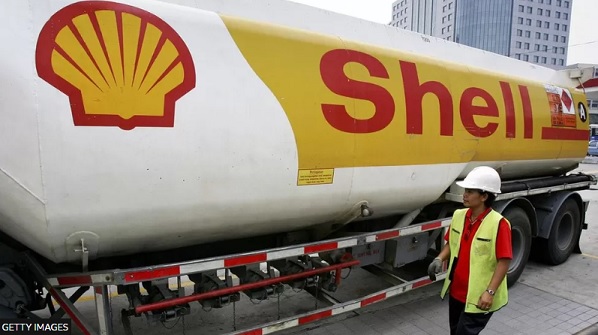
Oil and gas giant Shell has reported record annual profits after energy prices surged last year following Russia's invasion of Ukraine.
Profits hit $39.9bn (£32.2bn) in 2022, double last year's total and the highest in its 115-year history.
Energy firms have seen record earnings since oil and gas prices jumped following the invasion of Ukraine.
It has heaped pressure on firms to pay more tax as households struggle with rising bills.
Last year, the UK government introduced a windfall tax - called the Energy Profits Levy - on the profits of firms to help fund its scheme to lower gas and electricity bills.
Energy prices had begun to climb after the end of Covid lockdowns but rose sharply in March last year after the events in Ukraine led to worries over supplies.
The price of Brent crude oil reached nearly $128 a barrel following the invasion, but has since fallen back to about $83. Gas prices also spiked but have come down from their highs.
It has led to bumper profits for energy companies, but also fuelled a rise in energy bills for households and businesses. Along with rising food prices it has pushed inflation - the rate at which prices rise - to a 40-year high.
The government is limiting gas and electricity bills meaning that a household using a typical amount of energy will pay £2,500 a year, although this is due to rise to £3,000 in April.
However, that is still more than twice what it was before Russia's invasion.
In May, the government introduced its windfall tax on the profits made from extracting UK oil and gas. The rate was originally set at 25%, but has now been increased to 35%.
Oil and gas firms operating in the North Sea are taxed differently to other companies.
They pay 30% corporation tax on their profits as well as a supplementary 10% rate. On top of that, they now pay the windfall tax, which takes the total tax rate to 75%.
However, companies are able to reduce the amount of tax they pay by factoring in losses or spending on things like decommissioning North Sea oil platforms. It has meant that in recent years, energy giants such as BP and Shell have paid little or no tax in the UK.
Earlier this year, Shell said it would pay tax in the UK for the first time since 2017 as a result of the new windfall tax.
Shell chief executive Wael Sawan said the firm's latest results "demonstrate the strength of Shell's differentiated portfolio, as well as our capacity to deliver vital energy to our customers in a volatile world".
The annual profit figure far surpassed Shell's previous record set in 2008. The company also said it had paid out $6.3bn to its shareholders in the final three months of 2022, and that it planned another $4bn share buyback.
Labour's shadow climate change secretary Ed Miliband said: "As the British people face an energy price hike of 40% in April, the government is letting the fossil fuel companies making bumper profits off the hook with their refusal to implement a proper windfall tax.
"Labour would stop the energy price cap going up in April, because it is only right that the companies making unexpected windfall profits from the proceeds of war pay their fair share."

